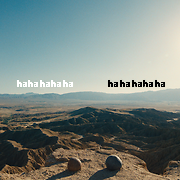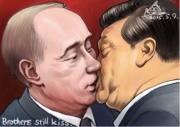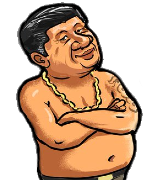(Thread IKs:
fart simpson)
|
https://www.youtube.com/watch?v=qwvJ2MnsOgY
|
|
|
|

|
| # ? May 25, 2024 00:19 |
|
Alibaba is gonna be competing directly in the west very soon
|
|
|
|
gradenko_2000 posted:Alibaba is gonna be competing directly in the west very soon Hot take: it will be under another name, because Americans are too racist
|
|
|
|
ikanreed posted:Hot take: it will be under another name, because Americans are too racist yeah they’ll think it’s an Arab company and treat it accordingly lol
|
|
|
|
check this out https://twitter.com/TurkmenDc/status/1555816423691325440
|
|
|
|
I’m glad Turkmenistan is keeping up the wierd as gently caress traditions as Garbanguly and Supramat, but man this new kid really ought to improve his eyebrow game he looks far too hapless we need more stern massive eyebrows
|
|
|
|
impressive.
|
|
|
|
even more impressive
|
|
|
|
ikanreed posted:Hot take: it will be under another name, because Americans are too racist Asia distance wealth? Almost good enough.
|
|
|
|
I tried search for the Chinese name but all that came up were a bunch of websites for hot DILFs in my area!
|
|
|
|
gradenko_2000 posted:Alibaba is gonna be competing directly in the west very soon that sucks, they probably won't be able to put super cheap bootleg jerseys and stuff on their platform anymore
|
|
|
|
Al-Saqr posted:I’m glad Turkmenistan is keeping up the wierd as gently caress traditions as Garbanguly and Supramat, but man this new kid really ought to improve his eyebrow game he looks far too hapless we need more stern massive eyebrows If they want to impress people by doing everyday activities they should be twitch streaming.
|
|
|
|
gradenko_2000 posted:Alibaba is gonna be competing directly in the west very soon Gonna be? Aliexpress is already pretty big, isn't it?
|
|
|
Kassad posted:Gonna be? Aliexpress is already pretty big, isn't it? I know people who use it but I never have because it takes weeks to get your poo poo and you have to pay customs tax at the post which is a hassle. Its definitely competing but I don't think I would say it's directly competing....
|
|
|
|
|
genericnick posted:Pretty sure someone linked a youtube in this thread. It's kind of worth it for the US Navy entry scene alone, though fundamentally it's the same action schlock.
|
|
|
|
IAMKOREA posted:I know people who use it but I never have because it takes weeks to get your poo poo and you have to pay customs tax at the post which is a hassle. Its definitely competing but I don't think I would say it's directly competing.... yeah the only time I've ever heard of anyone using it was to order bootleg or counterfeit clothing/accessories/games and niche hobby stuff, and I can't imagine the former sticking around very long if they plan on making serious inroads into America and Europe
|
|
|
|
this allusion meant posted:oh yeah considering how weak a lot of the cgi (and the voice acting obv) is it's impressive how menacing the american assault is in the early scenes. and the pure red flags of the pva are always gorgeous whenever they're on screen. it's a fairly good movie if you already feel the right way about it, i guess i thought it was a good action movie with good politics. good to see americans correctly depicted as invading orcs.
|
|
|
|
oh dang didn't realize the sequel's out now
|
|
|
|
mila kunis posted:i thought it was a good action movie with good politics. good to see americans correctly depicted as invading orcs. it's a kind of bad action movie with a couple good scenes and good politics I think
|
|
|
|
this allusion meant posted:oh yeah considering how weak a lot of the cgi (and the voice acting obv) is it's impressive how menacing the american assault is in the early scenes. and the pure red flags of the pva are always gorgeous whenever they're on screen. it's a fairly good movie if you already feel the right way about it, i guess The CGI is pretty weak overall but the scene where the US air force is strafing the Chinese who are hiding among the rocks is really good and terrifying, it's stuck in my mind since I watched it
|
|
|
|
indigi posted:it's a kind of bad action movie with a couple good scenes and good politics I think i enjoyed the action independent of the other stuff. the lying dead to american warplanes was sick. so was the village combat scene outside of the action i enjoyed the train travel to the front too
|
|
|
|
what i really want is someone to make something about the korean war with the blowback s3 trailer terrifying cold war + images of when Red mass politics was a thing aesthetic https://www.youtube.com/watch?v=IppvXLBsZ5c  
|
|
|
|
new Adrian Zenz just dropped https://www.islam21c.com/politics/nuclear-genocide-china-dropped-200-hiroshimas-on-uyghur-muslims/ quote:Abdulhakim A. Idris is the founder and Executive Director of the Center for Uyghur Studies, a Washington D.C.-based think tank. He is the author of the book “Menace: China’s Colonization of the Islamic World & Uyghur Genocide” and “Kizil Kiyamet”.
|
|
|
|
Pener Kropoopkin posted:new Adrian Zenz just dropped https://www.islam21c.com/politics/nuclear-genocide-china-dropped-200-hiroshimas-on-uyghur-muslims/ “Kizil Kiyamet” means “Red Apocalypse”
|
|
|
|
mawarannahr posted:“Kizil Kiyamet” means “Red Apocalypse” anti-China hit pieces always make them sound badass E: https://twitter.com/obsidianstatue1/status/1558332460995584000?s=20&t=f3hcFBcrJhN71qlAUAstgw this thread explains how generous the PRC's peace terms with ROC USED to be in contrast to how bellicose the PRC is now after the Pelosi incident. The most significant change is withdrawal of the promise not to garrison Taiwan after reunification. Now not only is de jure independence impossible but de facto independence in the long run. Negotiations won't start unless Taiwan meets over newer, harsher terms. America won't be capable of guaranteeing their security so now the PRC supposes they can play hardball. Pener Kropoopkin has issued a correction as of 21:02 on Aug 13, 2022 |
|
|
|
by those definitions reunification defacto happened in like 2014 I think both sides learned a lot from the return of Hong Kong in particular. reunification was never going to be even a 'puerto rico' type situation
|
|
|
|
mila kunis posted:something i think about and wish i had good sources to read is what amount of the failure of 20th century socialism was attributable to the economic system itself versus found a nice piece on how much access to the rich countries and technology and capital transfers matter vs marketization. good case study on South Korea and how it eventually overtook the DPRK (the author does take pains to point out that market access alone doesn't confer prosperity, but none of the stuff he documents here would have been possible without it!) https://eventsinukraine.substack.com/p/the-ukraine-south-korea-comparison quote:For Kusch, ROK economic development out of backwardness was essentially due to a change in the elite. This is an analysis that pays attention to the internal factors. There was a bad elite in the 50s and early 60s, then a good elite came along, that took economic statecraft seriously. This is a very popular perspective in the post-soviet world, which can integrate both IMF technocratic word-porridge about ‘corruption’ and populist slogans about the evil people ‘up top’ (Jews, masons, Sorosites, Russians etc) that need to be replaced by a harsh but wise father of the people quote:As Vivek Chibber2 notes in his comparative study of ROK and Indian 20th century economic development, both countries had a broadly similar politico-economic elite which espoused a combination of state-interventionism and export-promotion. Indeed, most third world countries in the 1960s and 1970s, let alone today, implemented economic policies broadly similar to that of the Park Chung-Hee’s ROK. But only the ROK truly industrialized. quote:if the ROK state was not all that different from other third world countries of the period, then what was the real difference between it and, say, India? quote:In the early 1960s, it became clear to the Japanese Ministry of International Trade and Industry (MITI) that the Japanese economy had to expand outwards and domestically restructure to survive5. Japanese competitiveness, hitherto founded on low wages and labor-intensive exports, was becoming seriously threatened for the following reasons: quote:MITI also advocated the economic development of ROK for broader reasons. Japan didn’t require the ROK simply as a manufacturing center– if it had, the ROK would have remained a fairly impoverished low-wage nation, albeit which produced shirts for export – like Bangladesh today. Japan also wanted ROK purchasing power to grow, so that they could buy Japanese goods. The closure of much of the once-important US market to Japanese exporters required the ‘creation’ of a new export market. quote:Japan was hence eager for the ROK to industrialize in the 60s and 70s, since it was doing so by buying Japanese capital goods, as we will soon see. For much of the 60s and 70s, a triangular trading pattern emerged, whereby the ROK had a trade deficit with Japan which was made up for through a trade surplus with Europe and the USA. quote:Korea’s first Five-Year Plan (1963-1967) required $200 million, only 30% of which the ROK was able to raise on international capital markets by 1964. Enter the Korean-Japanese Normalization Treaty of 1965 – as a result, Japan committed to $800 million over a 10 year period. Japanese companies agreed to lend $300 million and the Japanese government gave a loan of $200 million – and, remarkably, a grant of $300 million quote:The role of Japanese foreign investment in ROK industrialization also can’t be overstated. In the early 1960s, the ROK faced a problem familiar to poor nations – despite their best efforts to attract foreign investors from Europe and the USA, they were simply unwilling to invest in a country with such a small consumer market and low skill levels. But because of Japanese state policy, that changed dramatically. quote:Without Japan’s assistance, ROK industry would simply not have been able to penetrate the markets of the rich countries, and whatever investments made in the first five -year plans would have found no buyers. Japanese General Trading Companies (GTCs) already had decades of experience selling textile goods in the US. In the 1950s, they had been taught the specificities of the US market due to US geopolitical interests in seeing a prosperous Japan, and in any case boasted over 60 years of experience exporting Japanese textiles across the world. Urged on by MITI, Japanese GTCs taught their Korean junior partners about the various specificities of the US market and gave them the US contacts needed to sell there. quote:Japanese technology transfer quote:Korean firms also had access to informal ties with Japanese engineers, consultants, and technicians who came to the ROK on weekends or other holidays and assisted Korean firms in mastering new technology33. They did this as a way to earn extra money, but the linguistic ties between Korea and Japan were a crucial condition of possibility for such assistance. As the economic historian Alistair Amsden wrote, ‘access to such technical assistance placed Korea in an enviable position. Other late industrializing countries further afield from Japan culturally and geographically have lacked such a resource to draw on quote:The global capitalist system is very distinctly divided into high-income nations and low-income nations. In 2020, the high-income nations (earning upwards of $30,000 a year) composed only 11% of the planet’s population43. 84% of the planet’s population live in countries where the average income is less than $10 thousand a year. Only 5% of the planet’s population live in countries where the average income is between $10 thousand and $30 thousand – the ROK and Poland are members of this small group. Many of these countries used to be low-wage nations, and managed to significantly increase wages through exporting to the high-wage nations, almost always on the condition of their geopolitical importance in ‘containing’ threats to the domination of the high-wage nations. quote:The high-wage nations have always depended on the low-wage nations as a source for cheap imports to offset the effects on profitability resulting from increased domestic wages. Therefore the high-wage nations encourage – or militarily impose – economic liberalization on poor nations, to make sure that wages cannot grow behind protectionist barriers, and that they continue supplying the cheap goods that the rich countries need. quote:But the demand of the high-wage nations is limited – this is a market economy, where products are only imported when domestic consumers can pay for them. Accordingly, significant economic development through exporting to the rich capitalist nations is a path available only to 5% of the earth’s population. Europe and North America only need a fixed amount of consumer goods. They get more than enough of these goods from Mexico, Poland, coastal China and a handful of other low-wage countries. Lacking foreign investment, most of the poor capitalist world hence remains poor, and this is something that not even the wisest military dictator can change. They are simply unnecessary for the global market. There’s no domestic purchasing power, and the purchasing power of the rich countries is already satisfied. quote:Those poor countries that do ‘succeed’ in joining the outer edges of the globally parasitic rich countries did not do so because of the wisdom of domestic elites – it happens due to geographic and historical chance, as we have seen in the case of the ROK and Japan. mila kunis has issued a correction as of 21:47 on Aug 13, 2022 |
|
|
|
Chile has huge FDI, something like 10% of GDP year after year, and like Korea it's balance of trade went hugely positive in the 80s. Indonesia is also very high on the list of foreign investment, though it's a big country (#4 by population) and so not as high as a percent of GDP. I'm curious what you think about them, simply because neither is covered in US military bases nor do I think of either as a success story of joining the imperial system. but I'm pretty ignorant of both. edit: but yeah, capital heavy industries with exports to the imperial core is the winning strategy since the original form of imperialism collapsed, and Mao is somewhat right that the USA and USSR were both "first world"
|
|
|
|
mila kunis posted:i thought it was a good action movie with good politics. good to see americans correctly depicted as invading orcs. my view remains that a korean war movie with no koreans cannot have good politics, even if it's showing the right sides as good and bad
|
|
|
|
Antonymous posted:Chile has huge FDI, something like 10% of GDP year after year, and like Korea it's balance of trade went hugely positive in the 80s. Indonesia is also very high on the list of foreign investment, though it's a big country (#4 by population) and so not as high as a percent of GDP. don't know too much about indonesia but they didn't they massacre like half a million communists, overthrow their government and got on america's good side? not sure about their economic integration with the american system, but china certainly got it my thoughts on china are scattered across a few posts but what i think is: is that they got an absolutely bonkers deal. economic integration while maintaining sovereignty. mila kunis posted:imho with this + climate change + a government built on sectarianism india might be in for "not a good time" quote:the effect of economic strangulation and denial of trade with the already rich. both the USSR and china liberalized in the 80s. liberalization destroyed the USSR because it was still a rival and denied access to western capital and markets, china zoomed and took off because it was flooded with the same - i feel like that's a strong indicator that it wasn't privatization that enabled growth, but access to resources and knowhow, and privatization was just a demanded price of admission to being allowed access to those by the rich west quote:the only way china could get the massive capital investment it did was to make concessions to DC. led to some horrendous foreign policy poo poo like the sino-viestnamese war, but they maintained their sovereignity and independence and kept rigid state control over the capitalists (rather than vice versa) instead of having their elites hollow out their country like others that caved to american pressure, for example in south america, or become american protectorates like some in southeast asia.
|
|
|
|
my impression (and hope) is that america made a massive mistake by enabling the PRC, which they seem to have realized in the last decade. they can't reign them in like they did to germany and japan, and they're too big to simply crush or ignore like a smaller independent country would be.
|
|
|
|
rope merchant: hey where did all these guys get nooses from lol
|
|
|
|
https://twitter.com/ChathamHouse/status/1390284424806289410?s=20&t=nX1N9wt0GaG-7WBtkem7lg Dey took er jerbs and productive capacities!!!
|
|
|
|
DiscountDildos posted:https://twitter.com/ChathamHouse/status/1390284424806289410?s=20&t=nX1N9wt0GaG-7WBtkem7lg Hillary on board with seizing the means of production
|
|
|
|
ikanreed posted:Hillary on board with seizing the means of production there should be a big chyron on the bottom saying ‘HER HUSBAND SIGNED NAFTA’
|
|
|
|
Lol Hillary "Marx" Clinton.stephenthinkpad posted:So they just rely on big rear end magnet to create zero friction? That's new right? The operating maglev train in SH airport relys on electricity right. Yeah, that's my understanding is that this is the first maglev where the levitation is unpowered.
|
|
|
|
Btw, something like the Maglev mentioned was thought up back in the 2000s called the Inductrack but never was developed, supposedly some electricity has to be passed through the coils attached to the train even if the magnets are unpowered in order to move the train versus friction and air resistance.
|
|
|
|
Tangentially related that book about the KMT intelligence commander who was captured and rehabilitated was a good read if you like great Chinese poems and sayings and a overview of that era/the CPC through to the end of the Gang of Four. The ending Taiwanese and HK people not getting that seriously, he wasn't gonna stay in HK at the end and Beijing was building a socialist project to be proud of sounds familiar to anyone who's studied China It's in book thread as A KMT War Criminal in New China
|
|
|
|

|
|
|
|

|
| # ? May 25, 2024 00:19 |
|
Is that when Trump is (rightfully) reinstated as President? 
|
|
|
































